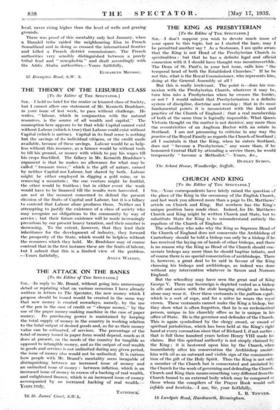CHURCH AND KING [To the Editor of THE SPECTATOR.] SIR, —Your
correspondentS have lately raised the question of the place of the King in the oeconomy of the English Church, and last week you allowed more than a page to Dr. Matthews' article on Church and King. But nowhere has the King's unique position been made clear. Indeed, for Dr. Matthews Church and King might be written Church and State, but to substitute State for King is to misunderstand entirely the regalism of the Church of England.
The schoolboy who asks why the King as Supreme Head of the Church of England does not consecrate the Archbishop of Canterbury should be told a bishop can only be a bishop if he has received the laying on of hands of other bishops, and there is no reason why the King as Head of the Church should con- secrate bishops any more than he should baptize infants, and of course there is no special consecration of archbishops. There is, however, a great deal to be said in favour of the King choosing his bishops and archbishops, as indeed was done without any intervention whatever in Saxon and Norman England.
But the schoolboy may have seen the great seal of King George V. There our Sovereign is depicted vested as a bishop in alb and al-nice with the stole hanging straight as bishops alone may wear it. Over these vestments is the pallium regale, which is a sort of cope, and for a mitre he wears the royal crown. These vestments cannot make the King a bishop, but they show what is often forgotten, that he is an ecclesiastical person, unique in his churchly office as he is unique in his office of State. He is the governor and defender of the Church. This is again symbolized- by the clergy sword, or sword of spiritual jurisdiction, which has been held at the King's right hand at every coronation since that of Richard I, if not earlier ; that is full three hundred years before Henry VIII made his claims. But this spirituaf authority is not simply claimed by the King ; it is bestowed upon him by the Church, when immediately after his consecration the Archbishop anoints him with oil as an outward and visible sign of the coirniunica- tion of the gift of the Holy Spirit. Thus the King is not only a member of the Church but is consecrated and anointed by the Church for the work of governing and defending the Church. Church and King then means something very different fromthc Church bound to an external body which may be composed of those whom the compilers of the Praker Book would call infidels and herelicks.--I am; Sir, your faithfully, L. B. Tow:N.-Tit.
18 Landgate Road, Handsworlh, Birmingham.










































 Previous page
Previous page